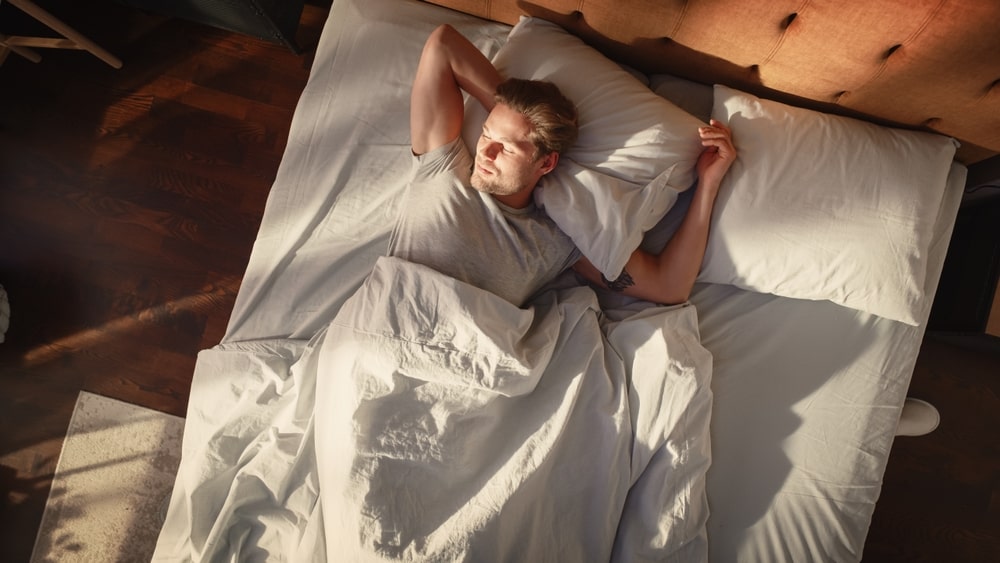
What is Sleep Efficiency?
Sleep efficiency is really just a simple calculation that tells you how much of your time in bed you actually spend sleeping. You can think of it as the percentage of your bedtime that's productive sleep rather than tossing, turning, or lying there with your mind racing about tomorrow's meeting or scrolling on your phone.
To provide an example of how the math works - if you spend eight hours in bed but only sleep for seven hours, your sleep efficiency sits at 87.5%. The higher the percentage, the better you're doing at making your bedtime count for something useful. You can let your body take care of the rest for the most part, it knows what to do.
You can track it with apps!
Most sleep tracking devices and apps can calculate this for you automatically, but understanding what the number means helps you make sense of whether your sleep quality matches how rested you feel in the morning. Research suggests that healthy adults usually achieve sleep efficiency rates between 85% and 95%, though this varies quite a bit depending on age, lifestyle, and your own circumstances. Some conditions, like sleep apnea, can also prevent you from getting the rest you need despite sleeping.
Is sleep efficiency impacted by age or sex?
Age has a pretty dramatic impact on sleep efficiency, and unfortunately, the news isn't particularly encouraging as we get older. Scientists have studied millions of sleep sessions, and they found that sleep efficiency will usually decline by roughly one percentage point per decade, which might not sound like much until you realise how it adds up over a lifetime.
Young adults in their twenties often achieve sleep efficiency rates above 95%, meaning they fall asleep quickly and stay asleep throughout the night with much less interruption. However, by the time people reach their sixties and seventies, average sleep efficiency might drop to the mid-80s or lower.
But why do older people have lower sleep efficiency?
The reasons behind this decline are pretty detailed and complex.. Older adults will often spend more time in lighter sleep stages and less time in the deep, restorative phases of sleep that leave you feeling properly refreshed. They're also more likely to wake up during the night, be that due to physical discomfort, bathroom trips, or simply because their sleep becomes more fragmented with age.
Sex differences in sleep efficiency are also interesting, and there’s a curious pattern that changes between the genders across different life stages. Among younger adults, women tend to sleep slightly more efficiently than men, possibly due to something called “sleep architecture” and hormonal influences. This advantage becomes even more obvious in older age groups, where women will keep up better sleep efficiency compared to their male counterparts.
However, there's a strange dip in female sleep efficiency during the middle decades of life, roughly corresponding to peak career and family responsibilities. This might reflect the reality that women have traditionally had many caregiving duties for children during this age, and the data will no doubt change on that as time goes on.
Is sleep efficiency improved by exercise?
Exercise and sleep efficiency have quite an interesting relationship that's more nuanced than you might expect. The simple answer is yes, regular physical activity generally improves sleep efficiency, but the relationship follows a curve rather than a straight line, and the timing matters, as anyone who has worked out before bedtime only to return completely alert has found out.
Sustained, somewhat moderate exercise seems to hit a sweet spot for sleep efficiency. Data from fitness tracking, for instance, shows that sleep efficiency peaks around moderate activity levels, which is pretty much equal to what a well-trained athlete might experience during a 10-kilometre run at a comfortable pace. This level of physical exertion seems to tire the body just enough to promote deeper, more efficient sleep without overstimulating the nervous system.
Interestingly, both very low activity levels and extremely intense exercise can actually decrease sleep efficiency. People who live sedentary lifestyles often struggle with sleep efficiency because their bodies haven't experienced enough physical fatigue to cause the natural sleepiness - you haven’t burnt that energy off, as your parents might have once said when you were bouncing from the walls before bedtime as a child.. On the other end of the spectrum, extremely intense workouts can cause more stress and that can impact sleep.
How much does lifestyle matter?
But of course, alcohol consumption, caffeine intake, and meal timing vary significantly between regions and countries. Mediterranean countries with traditions of lighter evening meals consumed earlier in the evening might see benefits in sleep efficiency compared to cultures where heavy, late dinners are more common.
That’s not to mention that in some countries, the availability and cultural acceptance of sleep aids, such as prescription medications or herbal remedies, vary considerably between regions. Some heavy sleeping pills are more common in the United States, for instance, but overreliance can ironically lead to poorer sleep.
Do hours in bed count towards sleep efficiency?
Yes and no.
If you get three hours of sleep a night, even 100% sleep efficiency won’t help. But sleeping twelve hours instead of eight isn’t going to help you get better sleep automatically. It might even make you feel more lethargic.
As such, 8-9 hours of sleep are recommended for most people, with older people often needing around 6-7. Children and babies, of course, need more and must have a consistent routine.
Try to stick to the same times so your body can wind down and wind up properly.
How can I improve and increase my sleep efficiency?
If you want to improve your sleep efficiency (and you should), it often demands us addressing multiple factors simultaneously, but luckily, small changes can give you pretty great results. The secret is to consider sustainable changes that help you fall asleep faster and experience fewer nighttime awakenings, rather than simply spending more time in bed.
-
Improve your sleep hygiene.
Sleep hygiene is a good first concept to focus on. That means putting together the right environment for comfortable sleep through your bedroom setup. Your sleeping space should be dark enough that you can't see your hand held out in front of your face. This might mean investing in blackout curtains, removing electronics with glowing displays, or using an eye mask if complete darkness isn't achievable for you. Make sure the bedding is clean and regularly changed, and that you use the best mattresses from Wolf.
-
Think of your sleeping temperature.
Temperature control matters, as we’ve all found out in a heatwave. Your core body temperature will drop as you prepare for sleep, and you can support this process by keeping your bedroom cooler than you might expect, typically between 60-67 degrees F will help. Heavy blankets can provide comfort and warmth while allowing your room to stay cool too. Moreover, if you take a bath or shower, you lose a huge amount of heat when you come out, which has helped some people find that relaxing ambience.
-
Consider sound.
Sound management is important for sleeping, as a neighbour’s dog will often remind us. Even relatively quiet noises can cause you to wake up, and that fragments your sleep and reduces its efficiency, even if you don't remember waking up. Earplugs are great, as are white noise machines, or apps that put out background sounds will help. Even a gentle music playlist could be enough, but keep it very quiet and think cellos, not guitars.
-
Exercise, even a little.
Physical activity during the day generally improves nighttime sleep efficiency, but timing and intensity matter as we went into above. Morning or afternoon exercise can help with better sleep, just try not to do too much, and don’t do it too close to bedtime.
With this advice, we hope you can understand sleep efficiency, and even improve it for the better. Sweet dreams!
